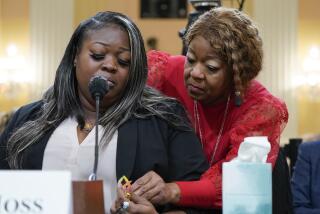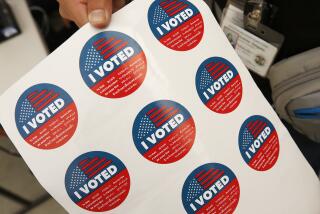Voters to Get $400,000 in O.C. Poll-Guard Suit : Election: Latinos reveal documents they say prove that Republicans intended to intimidate their ethnic group. GOP says insurance concerns forced deal.
SANTA ANA — Five Latino voters announced Wednesday they have accepted $400,000 to settle their lawsuit against Republican officials who posted uniformed guards at polling places last year, and they revealed documents that they said prove that the Republicans had intended to intimidate Latino voters.
The evidence released at a morning press conference included a deposition from Assemblyman John R. Lewis (R-Orange), who told attorneys he once joked with county Republican chairman Thomas A. Fuentes and the county GOP’s executive director Greg Haskin about the possibility of driving green vans around polling places to give the impression that Immigration and Naturalization Service agents were lurking in the area. That idea was not pursued.
Attorneys for the five voters said they believe that the evidence would have clinched a victory in the case, in which Assemblyman Curt Pringle (R-Garden Grove) and the county Republican Party were accused of conspiring to violate voting rights in Pringle’s race for the 72nd Assembly District seat.
But the plaintiffs said at the press conference that they decided to settle because the money was adequate and the suit had succeeded in highlighting the issue and forcing changes, such as a new state law barring use of uniformed guards at polling places.
The plaintiffs also decided to contribute $150,000 of the settlement to nonprofit, nonpartisan groups working for voter education and registration in Latino areas of Pringle’s district.
Attorney Joseph Remcho, representing the plaintiffs, said Pringle and the Republican officials “may have succeeded in buying this election with security guards,” but the settlement satisfies the five voters because it marks the highest sum ever paid in a voting-rights case.
“This clearly will send a message nationally that you just can’t do this,” Remcho said. “Goons in polling places will not be tolerated.”
Most of the Republican officials involved in the case failed to return calls Wednesday seeking comment on the settlement and the documents that were released. Others declined to discuss the settlement or could not be reached. Their lawyers said last week that they admitted no wrongdoing by settling the case.
The GOP’s Haskin declined to comment on Wednesday’s developments and instead referred a reporter to a prepared statement issued by the Republican Party’s defense attorneys last week. In the statement, the defendants said the five voters had “struck out” in their bids to overturn the election results and to prove any wrongdoing by Republicans.
Attorney Darryl R. Wold, who represented the county Republican Party, said the plaintiffs were on “a flight of fancy” in thinking they could have won the lawsuit.
Wednesday’s announcement marks the end of the federal lawsuit, which was scheduled for trial Jan. 16 in Santa Ana. The defendants disclosed the settlement on Friday, but it was not final until the plaintiffs signed it Tuesday night.
Flanked by four of the five plaintiffs, Remcho presented documents that he said made his case a “sure-fire winner.”
In addition to the Lewis deposition, the evidence included notes scribbled by political strategist Michael R. Williams after a meeting with another Pringle consultant, Carlos Rodriguez. Williams wrote in a corner of his calendar on Oct. 17, 1988, the words Carlos and goons and, in another corner, the names of security guard companies.
Also noted in the margin are the numbers of Republicans and Democrats registered in the area and Lewis’ name, which Remcho said indicates that the Orange assemblyman had been involved in the decision.
An Oct. 19, 1988, memo from Williams to Rodriguez outlines the security guard program, noting that the 20 guards would be in uniform and that “voters will be challenged.”
Wold, the county GOP’s attorney, said that the 20 guards did nothing wrong, that in final instructions the guards had been told not to challenge or stop voters and that Williams’ “goons” notation referred to Democrats who were allegedly registering voters illegally.
Other evidence presented included a map of the 72nd Assembly District, on which an employee of Rodriguez indicated to a sign-making company where they should post signs for the Pringle campaign, Remcho said.
The map showed plans to put signs reading “Thank You Curt Pringle” in predominantly Caucasian areas and signs--in Spanish and English--that said “Non Citizens Can’t Vote” in largely Latino areas.
One of the plaintiffs at the press conference, Jose Diaz Vargas, 53, a Santa Ana police officer, said he was on his way to vote on Nov. 8, 1988, when he heard that uniformed guards were patrolling the polling areas. He went home but later changed his mind in anger and went back to vote.
“I was very upset,” he said. “This kind of conduct, I did not expect this to happen in the United States. Maybe in some other countries, but not in the United States. . . . I went back to the voting place, but how many other people didn’t go back?”
The five plaintiffs will keep $17,000 each, Remcho said. They are Vargas; Rudy Rios, 39, a business agent for a local labor union; Helen Canales, 60, and her husband, Tommy Canales, 68, who are both retired, and Jane Fantauzzi, 74, a retiree who has since moved to Fontana.
Earlier settlements of $20,000 from the county registrar of voters and $60,000 from the firm that employed the security guards bring the total settlement to $480,000.
A sixth plaintiff, Rumaldo Madrid, got $2,000 from earlier settlement proceeds before he was dropped from the suit last month. Madrid, the only voter who contended that the guards actually dissuaded him from voting, was dismissed because he was not sure whether the guards who harassed him were the same ones hired by the Republicans. Republican officials cited that to bolster their contention that the guards did not keep anyone from voting.
The largest chunk of settlement money, $243,000, will go toward attorney’s fees and costs, which exceeded $400,000, Remcho said. Some of the legal debt will be eased with $100,000 raised by Democrats, Remcho said, including $50,000 in campaign money from Assembly Speaker Willie Brown, $35,000 from other Democratic legislators and $15,000 from private citizens.
The settlement encompasses all the remaining defendants: Pringle; the county Republican Central Committee and two of its officials, executive director Haskin and chairman Fuentes; Lewis; Pringle’s campaign manager, Marsha Gilchrist; political consultants Williams and Rodriguez, and attorney William P. Godfrey.
Remcho said the plaintiffs had no interest in using the lawsuit as a political weapon to damage Pringle’s image in 1990, when he can run for reelection. They said it is more important to funnel $150,000 into Latino voter registration and education projects.
“It wasn’t a partisan thing,” Rios said. “These were my civil rights.”
Defense attorneys said the defendants did not want to settle, but their insurance companies insisted “for purely economic reasons.”
If the defendants had chosen to go to trial anyway, they would have given up their right to insurance coverage for their legal fees, the attorneys said. The insurance firms will pay the $400,000.
County Republican Party officials contend that they did nothing wrong by posting the guards at polling places in predominantly Latino areas of Santa Ana. They said the guards were there only to monitor possible election fraud, in response to a rumor that Pringle’s Democratic opponent, Christian (Rick) Thierbach, planned to bring in illegal voters to tip the contest in his favor.
But Democrats and Latinos said that the guards, who carried signs in English and Spanish warning that non-citizens cannot vote, were trying to scare Latinos away from voting booths.
Local and federal agencies are still investigating to see whether criminal charges should be filed over the posting of the guards.
Thierbach, who lost the 72nd Assembly District seat to Pringle by 867 votes, said it is a shame that “the insurmountable evidence of illegal activity” by the Republicans will not be revealed in a trial.
More to Read
Sign up for Essential California
The most important California stories and recommendations in your inbox every morning.
You may occasionally receive promotional content from the Los Angeles Times.










